 |
Biblical
Doctrine
Knowing why you believe what you believe
|
 |
Biblical
Doctrine
Knowing why you believe what you believe
|
| I'm constantly amazed at how little Christians really know about their own faith. The late Dr. Walter Martin of the Christian Research Institute once said that the average Jehovah's Witness can make a doctrinal pretzel out of the average Christian in about 30 seconds. Below are some of the orthodox Christian doctrines that believers have adhered to for almost two millenium. |

| This is far and away the most attacked biblical doctrine by cultists and skeptics. Since anti-Christians use "reason" to determine truth, the Trinity cannot be true, since it is "unreasonable". So, if it cannot be fathomed by our limited, finite minds, then it must be false, some will argue. However, we have a sinful, fallen nature and intellect, which clouds all our judgements and determinations. What we can know about God is only what He chooses to reveal to us about Himself. And if He reveals that He is one God, existing in three persons, then we must accept it. After all, He is infinite and we are not. |
There are many views of God clamoring for our attention. Romans 1:18-25 declares that men in their unrighteousness suppress the truth about who God is and create their own gods and worship and serve them. The cults usually attempt to define God with human reasoning as the point of authority rather than the Scripture. Several points to consider about the Trinity are as follows: |
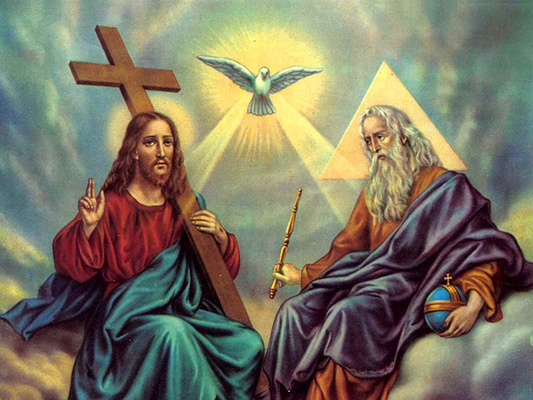 |
![]()
1. God is unique - the only one of His kind and therefore it is presumptuous of us to try to force Him to fit into our box. We must allow Him to be as He has revealed Himself to be. 2. The Bible says that He is a mystery (Isa. 55:9; Col. 2:2; I Tim. 3:16), i.e. that which is revealed but not altogether understood. 3. Some claim that the Trinity is a pagan doctrine formulated by the Council of Nicea in 325 A.D., displaying a woeful ignorance of church history. Instead, we should say, "My basis is what the Bible teaches about who God is, and if the Bible teaches that God is triune then that's His nature." 4. It is important to clarify several
points: |
![]()
The unity of the Godhead (one nature) is seen in the following passage: Deut. 6:4 "The LORD (Jehovah) our God (Elohim - plural) is one (*echad) LORD." [*Echad - Hebrew - "composite unity", "united" - see Strong's, "one" as in Gen. 2:24]. Jesus is God equally with the
Father. |
|
Matt. 28:18 |
Col. 2:3 |
Matt. 18:20 Matt. 28:20 Eph. 1:23 |
Isa. 9:6 Micah 5:2 John 8:35 John 8:58 |
2. He is called God explicitly in the New Testament. Matt. 1:23 "Emmanuel....God with
us." |
 |
3. He is described in terms reserved
only for God.
a. Creator of
all things - John 1:3; Eph. 3:9; Col. 1:16,17; Heb. 2:10; Rev. 3:14
b. The Almighty
- Rev. 1:8 with 21:5-7; 22:12-13, 16,20
c. The First
and the Last - Rev. 1;17; 2:8; 22:13. Compare Isa. 44:6
d. He that has
seen the Son has seen the Father - John 12:45; 14:9
|
4. He is worshiped as God. Prayer is a form
of worship. |
5. Jesus is Jehovah proved by
cross-referencing the Old Testament and the New.
Isa. 40:3 and
John 1:23; 3:28
Isa. 45:23 and
Phil. 2:10,11; Rom. 14:11
Psa. 102:24-27
and Heb. 1:10-12
I Kings 8:39
(note "alone") and Rev. 2:23
Psa. 45:6,7
and Heb. 1:8,9
Joel 2:32 and
Rom. 10:9,10
Exodus 3:14
and John 8:58,59
Isa. 44:24 and
John 1:3
Isa. 6:1-10
and John 12:37-41
Isa. 60:19 and
Luke 2:30-32
Isa. 8:13,14
and I Pet. 2:7,8
Mal. 3:1 and
Matt. 11:10
Isa. 42:8 and
John 17:5
Isa. 45:25 and
Mk. 2:7
Exodus 19:18-21
and Heb. 12:18-26
Zech. 12:10
and John 19:34-37
Psa. 23:1; Isa.
40:10,11 and John 10:11
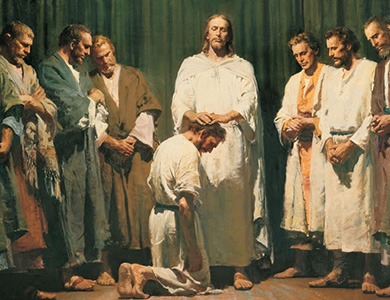 |
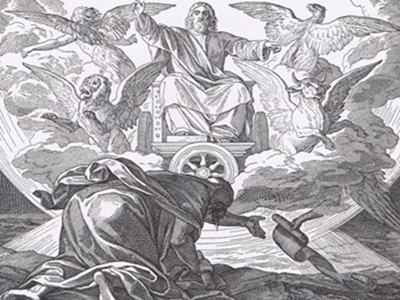 |
![]()
Jesus is "God manifest in the flesh" - I Tim. 3:16
1. Philippians 2:5-8 Jesus "being in the form of God" (deity), did not consider it something to cling to, but emptied himself of his divine perogatives and powers, not his divine nature, and took upon his divine form 'the form of a servant', or humanity, in order to suffer death." Phil. 2:9 He has the name that is above Every name, which is Jehovah. See also Eph. 1:21 and Col. 2:10 Phil. 2:10,11 Every knee will bow and every tongue confess that Jesus is Jehovah. Compare Isa. 45:23; Isa. 48:11 2. John 1:1 "In the beginning was the Word and the Word was with God (the Father and Holy Spirit), and the Word was God." John 1:14 "And the Word was made flesh and dwelt among us....." 3. Heb. 1:3 Jesus is the visible manifestation of God (Jn. 14:9), the reflection (Greek - apaugasma) of God's glory (see Isa. 42:8), and the exact impression (Greek - charakter) of his substance (Greek - hupostasis), or nature. Please note, no finite creature could be so likened to the Infinite God (Isa. 46:9). Heb. 2:9,10 Jesus set aside his infinite glory to be one of us. He who is eternal God became man for the suffering of death so that the horrible debt of sin was paid. He now as a man (though also God) is our Captain to take us as sons of God into glory. The gulf between God and man is now spanned by the God-man. 4. Jesus did all he did as a man, not by his power as God, which power he set aside to become man. He was our perfect example in order that he might be our perfect mediator (I Pet. 2;21). |
![]()
He prayed to his Father (Jn. 17:1). He did not possess all knowledge while a man (Matt. 24:36; Mark 5:30,31). HIs miracles were done by him in faith, by the power of God through the Spirit (Jn. 5:19,30; Jn. 8:28 compare Isa. 11:2; 61:1; and Acts 10:38). He was capable of suffering and feeling temptation (Luke 4:1,2). His Father was, and is, positionally greater (not better) than He (Jn. 14:28; Rev. 1:1). |

![]()
Trinitarian theology came about by noting several facts about God from the Scriptures:
| Thus, the Father, the Son, and the Holy Spirit are the 1 God. Can I comprehend it? No. But this is the way God has revealed Himself, and I must accept it. |
|
|
 |
John Calvin |
| The basic message of the Gospel of Jesus Christ is that He came to die for our sins, because we were unable to save ourselves. The church fathers coined the phrase "total depravity" or "total inability" to save ourselves. The Apostle Paul states that we are "dead" in our sins. Dead men cannot do anything, much less work for their salvation. It is Jesus Christ who makes us alive when we simply accept His sacrifice for us. |
James chapter 2
Faith Alone?
![]()
The Gospel: Salvation By Grace
Through Faith In Christ Alone.
"....for if one comes and preaches another Jesus....or a different gospel...." (II Cor. 11:4)
Just as they cults describe and worship a different Jesus they also, as a natural consequence, pervert the gospel. The cults produce a Jesus who cannot save, "secretly introducing destructive heresies, even denying the Master who bought them." (II Pet. 2:1). One of the distinguishing marks
of a cult is the presentation of one of the following plans for salvation. |
Paul
strongly warns:
| "I am amazed that you are so quickly deserting Him who called you by the grace of Christ for a different gospel, which is really not another, only there are some who are disturbing you and want to distort the gospel of Christ." (Gal. 1:6-7) |
Paul
describes the crux of the issue in Rom. 10:1-5:
| "Brethren, my hearts desire and my prayer to God for them is for their salvation. For I bear witness that they have a zeal for God but not in accordance with knowledge, for not knowing about God's righteousness (standard of perfection - Matt. 5:48, I Pet. 1:15-16) and seeking to establish their own, they did not subject (submit, surrender) themselves to the righteousness of God, for Christ is the end of the law for righteousness to everyone who believes (Matt. 5:17, I Cor. 1:30, Rom. 4:24). |

Every Christian should understand that salvation means to be in right standing before God - righteous, justified; and that this is accomplished entirely by God's grace through our faith in Christ's finished work alone on our behalf. Grace and works are incompatible as Paul affirms; "....if it is by grace it is no longer on the basis of works, otherwise grace is no longer grace" (Rom. 11:6). "For by grace you have been saved through faith and that not of yourselves, it is a gift of God, not as a result of works so that no one should boast" (Eph. 2:8-9). "But by His doing you are in Christ Jesus who became to us wisdom from God and righteousnes and sanctification and redemption" (I Cor. 1:30). "So we, too, have put our faith in Christ Jesus that we may be justified by faith in Christ, and not by observing the law, because by observing the law no one will be justified" (Ga. 2:16). Works (law-keeping) and grace are mutually exclusive "because by the works of the law no flesh will be justified in His sight...." (Rom. 3:20). Under law God demands righteousness from men; under grace, God gives or imputes righteousness to men (Rom. 4:4-6) If a man is to find right standing with God he can either deserve it, (perfect works), or not deserve it but get it anyway (grace). |
*Extremely Important!*
| Salvation is by grace alone through faith alone in Christ alone, which takes us all the way positionally, legally, and ultimately experientially to the right hand of God, in His presence. |
| "But God, being rich in mercy, because of His great love with which He loved us, even when we were dead in our transgressions, made us alive together in Christ (by grace you have been saved) and raised us up with Him and seated us with Him in the heavenlies, in Christ Jesus" (Eph. 2:4-6 cf. I Cor. 1:30) "giving thanks to the Father who has qualified us to share in the inheritance of the saints in light. For He delivered us from the domain of darkness and transferred us to the kingdom of His beloved Son, in Whom we have redemption, the forgiveness of sins" (Col. 1: 12-14). |
*Seed Planter - Ask the question, "Who deserves the credit (or who will deserve the credit) for your being a Christian (your eternal life) - you or God?" The incompatibility between the cults teaching a works system of salvation and the Christian gospel of grace is obvious, BUT what is much more subtle and therefore much more dangerous is the disguised counterfeit of a grace and works mixture. |
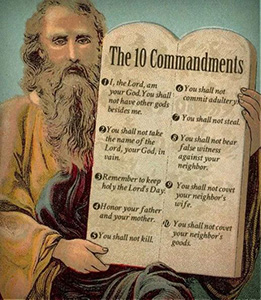 |
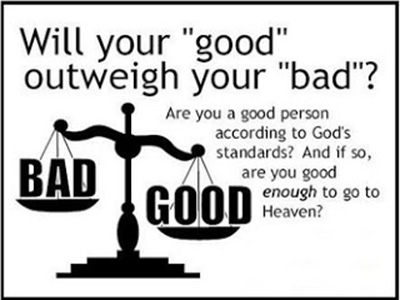 |
Many groups present this in varying ways such as Roman Cathlicism, most Churches of Christ, most Seventh-Day Adventists, Mormonism, The Way, International, etc. The first thing they do is say that grace is God's part, providing everything necesary; the second is man's part in that he must do something to appropriate the grace. It usually follows this pattern: 1. Believe At this point, some cults try to get around the biblical language by trying to make a distinction between God's moral law (Mosaic law) and obedience to Christ's commands. BUT, God's law is the same, whether it comes through Moses or Christ (who is God anyway). Christ's commands were not any less than the "law of Moses" (Rom. 7:12, Rom. 3:31, Matt. 5:17, 18-48, 22:36-40). This is further confirmed in Rom. 3:20 - Rom. 4 as it applies salvation apart from works of law to Abraham who lived hundreds of years before Moses. |
Grace\Works Mix
| Paul saw and the Scriptures teach clearly that for man to earn even a part of his salvation by his own keeping of God's law is to reject the cross of Christ. If we have to fill up even the smallest gap by our own works, then we are still lost in sin (Isa. 64:6). We must trust in Christ for all or for nothing at all. To trust Him only in part is the very essence of unbelief. The only two options are to keep all of the commandments perfectly (not neglecting by commission or omission), or to accept the free gift of the grace in the cross. Otherwise, one would be saying that one must finish the work of Christ oneself by obedience to the law. Paul had some very strong words for that audacity: |
| "It was for freedom that Christ set us free, therefore keep standing firm and do not be subject again to a yoke of slavery. Behold I say to you that if you receive circumcision (works), Chist will be of no benefit to you. And I testify again to every man who receives circumcision that he is under obligation to keep the whole law. You have been severed from Christ, you who are seeking to be justified by law, you have fallen from grace" (Gal. 5:1-4). |
*Seed Planter- always seek to demonstrate that the only alternative to the good news of Christ's grace is a mission impossible - perfection! (Matt. 5:48; Jas. 2:10; Gal. 3:10). Additionally, illustrate the distinctive stages in the process of salvation and the elements contained in each. These are: propitiation, regeneration, justification, adoption, sanctification, and glorification. |
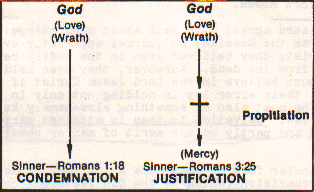
| Note:For all cults, justification must be distinguished from sanctification. Roman Catholicism, Church of Christ, Seventh-Day Adventism, Mormonism, etc., have historically confused justification with sanctification. Although they are inseparably linked, justification always leads to sanctification, NEVER sanctification leading to justification as is the heretical doctrine of the cults. |
|
|
Salvation |
|
|
|
|
|
|
Accomplished |
Maturing |
Fully matured |
|
|
|
|
It is absolutely impossible for human works to form the basis of justification or salvation, for what God requires - our perfect obedience to the law - is impossible (Rom. 3:28; Gal. 2:16; Jas. 2;10; Gal. 3:10). *Seed Planter - Always
bring the person back to the issue of two choices: |
Striving to earn salvation |
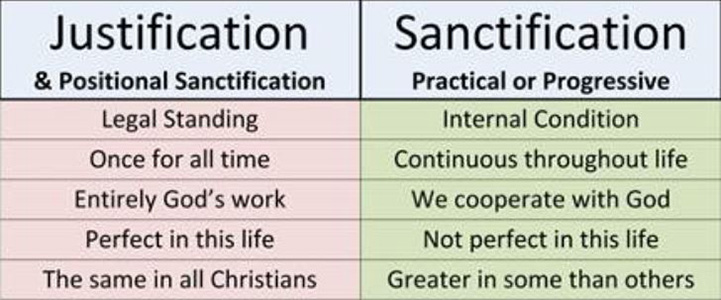 |
Review:
Justification is based upon three great transactions rooted in the historical
redemptive work of Christ.
1. Christ's
perfect life of sinlessness and total obedience to the law of God
(God's only standard) is imputed (transfered, reckoned) to our account.
God
accepts us as righteous by the virtue of the substitutionary obedience
of
Christ (Rom. 5:18).
2. Our life
of sin and guilt was imputed to Christ's account and He bore the
curse of the law in our place (II Cor. 5:21; Gal. 3:13).
3. By the resurrection
of Christ from the grave, God the Father demonstrated
that He accepted the obedience of Christ and thus it is foundational to
our
total justification (Rom. 4:25).
Always be reminded that the basis for our authority is the Scritpure and not merely proof-texting,
in addition to the systematic contextual teaching of Scripture. Romans
and Galatians is a good place to make camp. As has been repeatedly
emphasized, the cults always present a plan of salvation that is based
on how good we become - they never understand regeneration, justification,
and adoption. Mostly, their understanding is that Jesus died for Adam's
sin, wiping out past sins and now grace is infused into our life like a
storage tank, and with God's help we can and must become more and more
holy, and at the end God will determine our faithfulness and accept or
reject us. |
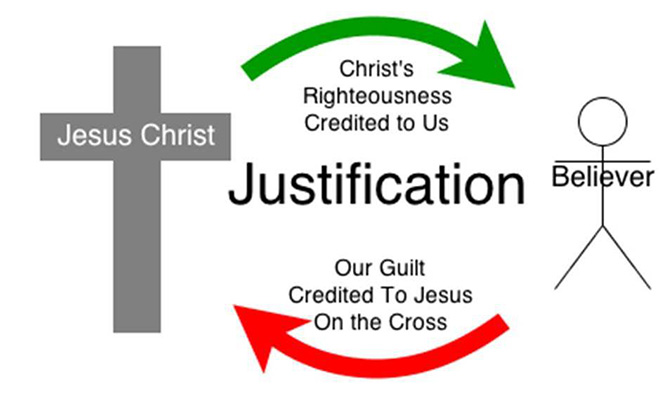 |
The cults' impression of the doctrine of justification by faith alone in Christ alone is that a man is saved no matter what they do, or that he can then go out and do whatever he wants. But that is not our position nor the Bible's. We believe that man is saved by faith alone, but never a faith which will remain alone. | 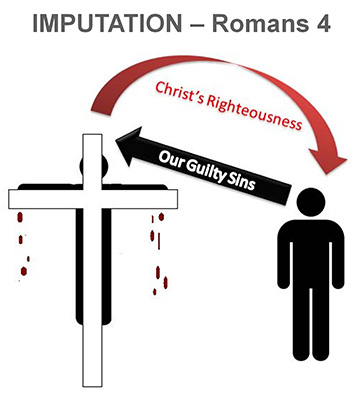 |
| Sanctification
is described as putting off the old man and putting on the new (Eph. 4:20-24),
or transformation. Because of the continuing presence of the old man or
residue of our old nature still active, the Lord continually exhorts us
with passages like "if you love me you will obey my commandments."
Remember - we are saved unto the law to obey it. It is now seen as the law of the Spirit and life rather than the law of sin and death (Rom. 3:31; I Cor. 9:21). It is still the standard of holy living for our training in righteousness. |
| We could be saved by the law if we were perfect. Yet Scripture makes it clear that if we break the law at one point, we are guilty of breaking all of it (Jas. 2:10). Moreover, we are told that all have sinned and fallen short of the glory of God (Rom. 3:23). Therefore, if we are to be justified, it has to be by grace - the gift of the remission of sins that goes out to the undeserving sinner. Our responsibility is simply to accept and receive, to reach out to the Hand that is outstretched to save us. |
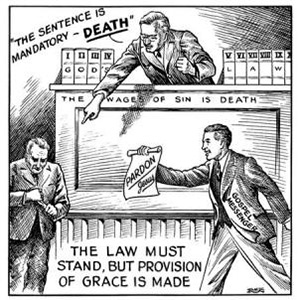
Ephesians 2:8,9 - "For it is by grace you have been saved, through faith - and this not from yourselves, it is the gift of God - not by works, so that no one can boast." Romans 4:2 - "If, in fact, Abraham was justified by works, he had something to boast about - but not before God." Romans 5:1 - "Therefore, since we have been justified through faith, we have peace with God through our Lord Jesus Christ." Titus 3:5 - "He saved us, not because of righteous things we had done, but because of His mercy." Romans 3:20 - ".....by the works of the Law no flesh will be justified in His sight." Isaiah 64:6 - ".....all our righteous acts are like filthy rags [to God]." |
![]()
| Some of the cults, including the Mormons, Jehovah's Witnesses, Campbellites (Church of Christ and others), etc., use James chapter 2 in an attempt to show that works do count for salvation. The Apostle James states, "Faith without works is dead." However, James is not saying, "Faith plus works justifies a person before God". He is merely saying that works will always follow true saving faith. If a person is truly saved, he will produce good works, though those works won't save him. So, if I see a person who claims to be saved, but they lack good works, this is a good indication that they don't have saving faith either. |
![]()

| The concept of a loving God is unbalanced without justice. We are fallen human beings, and our understanding of true justice has been twisted. God sees sin as a much more serious offense than do we. He will reward those who trust in Him with eternal blessedness. But, in the same way, He will punish those who reject Christ's sacrifice with eternal punishment. Below are some verses which show this orthodox Christian doctrine. |
| Luke 16:22-23 - "The rich man also
died and was buried. In hell, where he was in torment, he looked up and
saw Abraham far away....."
Matthew 25:46 - "Then they [the unsaved] will go away to eternal punishment, but the righteous to eternal life." Revelation 20:15 - "If anyone's name was not found written in the book of life, he was thrown into the lake of fire." II Peter 2:9 - "the Lord knows how.....to hold the unrighteous for the day of judgement, while continuing their punishment" (this is a present participle - or while being punished - right now). |
| Eternal
punishment cannot mean annihilation, for by its very
nature punishment requires a conscious person to experience it. A
person who has been annihilated doesn't experience anything,
much less torment for eternity. The reasoning that the cults use just doesn't
add up. To address the passage in Luke 16:19-31, when Jesus taught the people with parables, He never used formal or specific names in them, and He always used real-life situations which everyone could relate to. The story of the rich man and Lazarus is certainly not a common situation faced by the people of that day, and a specific name is given as well (Lazarus). It tells a real story of two real people beyond the grave. |
| A look at Revelation 14:9-11 shows further evidence of eternal doom for those who reject God. "He [one who worships the beast] will be tormented with burning sulfur in the presence of the holy angels and of the Lamb. And the smoke of their torment rises forever and ever. There is no rest day or night for those who worship the beast and his image or for anyone who receives the mark of his name." Lutheran scholar R.C.H. Lenski comments: |

|
The strongest expression for our "forever" is eis tous aionan ion aionon, "for the eons of eons"; many eons, each of vast duration, are multiplied by many more, which we imitate by "forever and ever." Human language is able to use only temporal terms to express what is altogether beyond time and timeless. The Greek takes its greatest term for time, the eon, pluralizes this, and then multiplies it by its own plural, even using articles which make these eons the definite ones." (Revelation - Minneapolis: Augsburg, 1961, p.438). |